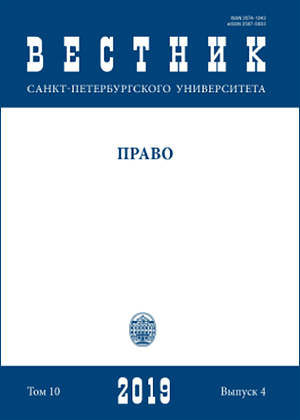Bringing the former president of Chad H. Habré to justice and the Extraordinary African Chambers
DOI:
https://doi.org/10.21638/spbu14.2019.405Abstract
Hissene Habre seized power in Chad as a result of long civil war in 1982 and organized largescale repressions of his political enemies during his rule. In 1990, he was deposed by a military coup and fled to Senegal, where he got asylum. This paper discusses the institutional aspects of the legal prosecution of H. Habre, which began in 2003 when proceedings against him were instituted in Belgium, and analyzes the Judgment of the UN International Court of Justice in the case of Belgium v. Senegal of 2012. Much attention is paid to the special international court — the Extraordinary African Chambers in the Senegalese legal system that were established by the Agreement between the African Union and Senegal in 2012 to investigate international crimes committed on the territory of Chad from 1982 to 1990. This paper analyzes the structure of the Extraordinary African Chambers and their jurisdiction. In 2016, the Extraordinary African Chambers sentenced H. Habre to life imprisonment, and this verdict came into force in 2017. According to the author’s opinion, the trial of H. Habre has important political and juridical meaning. A politician, who had come to power with the help of the United States and other Western countries and who had been their strong ally during his rule, protecting their interests in Central Africa, was brought to justice.
Keywords:
international criminal law, international courts, international crimes, United Nations International Court of Justice, African Union, responsibility of heads of state
Downloads
References
Downloads
Published
How to Cite
Issue
Section
License
Articles of "Vestnik of Saint Petersburg University. Law" are open access distributed under the terms of the License Agreement with Saint Petersburg State University, which permits to the authors unrestricted distribution and self-archiving free of charge.






